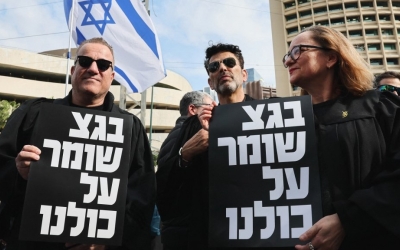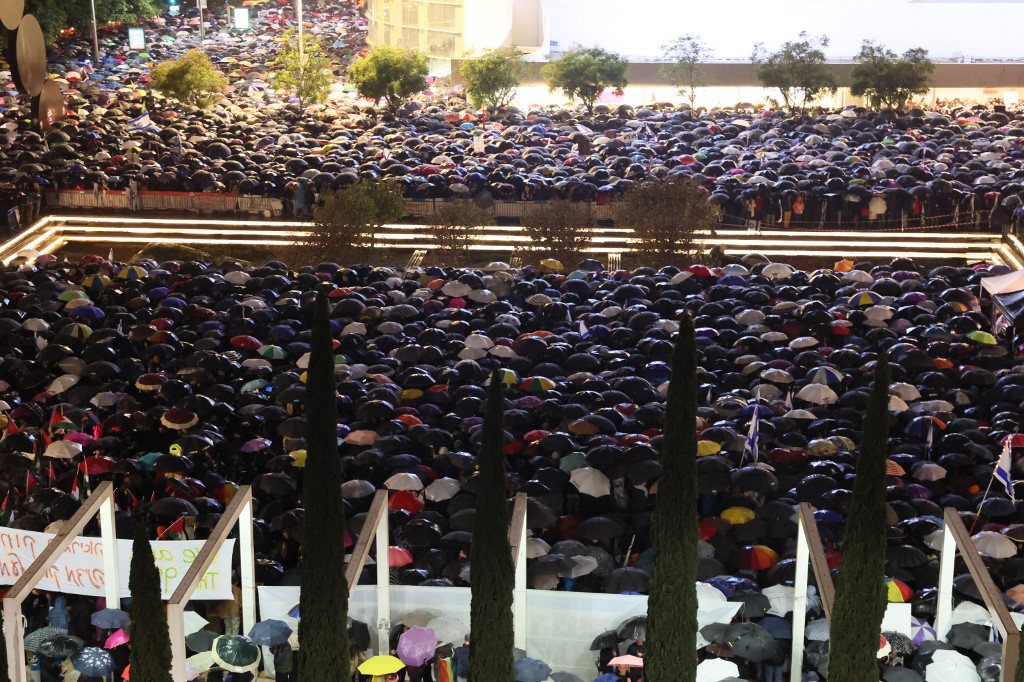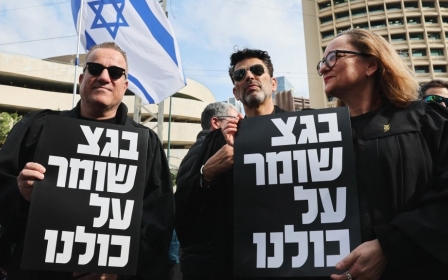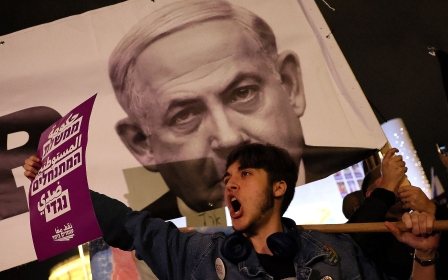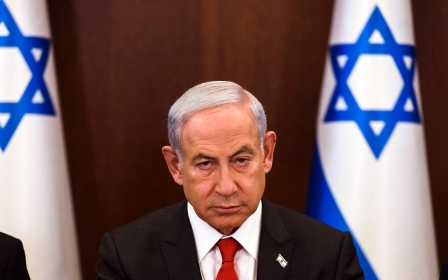Israel: Tens of thousands protest government in Tel Aviv
Tens of thousands of Israelis took to the streets in central Tel Aviv on Saturday to protest Prime Minister Benjamin Netanyahu's new far-right coalition government.
Police in Tel Aviv said around 80,000 protesters had gathered at and around Habima square. Protests were also taking place in Jerusalem, Haifa and other cities, as centre and left-wing parties, including the Hadash-Taal alliance - a joint list of two Arab-majority political parties - called on Israelis to reject new government policies.
New MEE newsletter: Jerusalem Dispatch
Sign up to get the latest insights and analysis on Israel-Palestine, alongside Turkey Unpacked and other MEE newsletters
The demonstrations were organised under the call of "saving democracy", in criticism of some hardline stances the ultra-conservative government has adopted, including planned reforms to the country's justice system.
A main concern of opposition groups is a recently-proposed reform that would allow parliament to override decisions made by the Supreme Court. Analysts have warned that such a programme could potentially allow lawmakers to uphold any annulment of the corruption charges Netanyahu is being tried on.
An open letter published on Thursday by 11 former prosecutors said the reforms threaten to destroy Israel's judiciary.
Retired Supreme Court President Ayala Procaccia addressed those on the streets of Tel Aviv on Saturday, warning that "a country in which judges go out to protest is a country where all lines were crossed", Haaretz reported.
'Fascists in the Knesset'
Itai Niger, a 37-year-old from Tel Aviv, told Middle East Eye that he had attended the protest because he hoped to help send a message against "the regime and fascism".
'This government is really dangerous and has the potential to change things for the worse'
- Itai Niger, 37, protester
"I can’t stay at home and do nothing anymore," Niger said. "I decided to take part against what is happening now because this government is really dangerous and has the potential to change things for the worse in terms of rights.
In Israel, there is already a big problem of inequality, and there will be more abuse of power and corruption now. If there is a way to stand against that, then I will be there."
"I really, really hope that this marks some kind of awakening in this country," he continued.
In addition to court reforms, opposition protesters rallied against the new government's intentions to pursue a policy of settlement expansion in the occupied West Bank and social reforms that have worried members and supporters of the LGBTQ+ community.
Signs written in Hebrew and Arabic held up by the demonstrators gathered in Habima Square on Saturday reflected the diversity of demands: "The time has come to bring down the dictator"; "government of shame"; "There is no democracy with the occupation "; "Bibi does not want democracy, we do not need fascists in the Knesset"; "Iran is here"; and "You will love the other as yourself".
Rain started early Saturday evening, raising worries that the weather could affect attendance, but opposition leaders called on protesters to come out despite the wet conditions.
"Everyone should take an Israel flag in one hand, an umbrella in the second and come to defend democracy and the law in Israel," former Defence Minister Benny Gantz said on Twitter on Saturday ahead of his arrival at Habima square.
Many did just that, as images show blocks of demonstrators carrying overlapping umbrellas, creating a cover that obscured the people huddled beneath them.
Netanyahu is the first sitting Israeli prime minister indicted while in office. He denies the charges against him of bribery, fraud and breach of trust. He took office late last month following his 1 November election win, heading a coalition that includes a politician who last year admitted tax evasion and a clutch of far-right personalities, including one who once kept a portrait in his home of a man who massacred scores of Palestinian worshippers.
Last week, the new national security minister, Itamar Ben-Gvir, ordered the state's police commissioner to enforce a directive to remove Palestinian flags from public spaces a day after one was waved at a previous anti-government protest in Tel Aviv.
Despite the order, several Palestinian flags were spotted during Saturday's demonstration in the coastal city.
Middle East Eye delivers independent and unrivalled coverage and analysis of the Middle East, North Africa and beyond. To learn more about republishing this content and the associated fees, please fill out this form. More about MEE can be found here.


